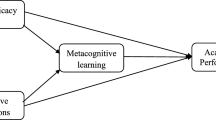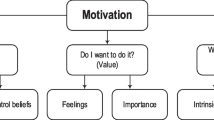Abstract
A specially-designed self-assessment questionnaire (SAQHOCS), containing higher-order cognitive skills (HOCS)-type questions, was administered to 71 biology majors, enrolled in a four-year college program. The gap between students' self-assessment marking, and that of their HOCS-biased teachers (the authors), is accounted for by the prevailing LOCS-orientation and the “testing culture”—a total separation between testing and learning—in contemporary science teaching. The majority of the students in the study evaluated themselves as capable of self-assessment, and felt reasonably confident in doing so. They were quite reserved as far as the applicability of the self-assessment method to nonalgorithmic (“correct/incorrect”) questions is concerned. The results of this study suggest that the potential for student self-assessment within college science teaching and learning exists. However, still a great purposed effort in HOCS-oriented teaching and learning is required in order for the student self-assessment practice to become a routine integral component of HOCS science examinations.
Similar content being viewed by others
REFERENCES
Adey, P., and Shayer, M. (1994). Really Raising Standards, Routledge, Hants.
Anderson, R. D., Anderson, B. L., Varanka-Martin, M. A., Romagnano, L., Bielenberg, J., Flory, M., Mieras, B., and Whitworth, J. (1994). Issues of Curriculum in Science, Mathematics and Higher Order Thinking Across the Disciplines, U.S. Department of Education, Office of Research, Washington, DC.
Assessment Subject Group (1995). Research in Assessment XII. Science Ain't Easy, Royal Society of Chemistry, Education Division, Aston, UK.
Baker, E. L. (1991). Developing comprehensive assessment of higher order thinking. In Kulm, G. (Ed.), Assessing Higher Order Thinking in Mathematics, American Association for the Advancement of Science, Washington, DC, pp. 7-29.
Bol, L., and Strage, A. (1996). The contradiction between teachers instructional goals and their assessment practices in high school biology courses. Science Education 80: 145-163.
Breen, T. J., Baxter, G. P., Glaser, R., and Raghavan, K. (1994). Assessment of Higher Order Thinking Skills: Evidence from Selected State Testing Program. Paper presented at the Annual Meeting of National Association of Research in Science Teaching. Anaheim, California.
Collins, A. (1993). Alternative Assessment in Undergraduate Science Education. Proceedings of the National Science Foundation Workshop on the role of Faculty from the Scientific Disciplines in the graduate Education of Science and Mathematics Teachers. National Science Foundation, Washington DC, pp. 123-126.
Conway, P. F., Clark, C. M., and Ben-Peretz, M. (1995). The Good Test: A Mathematic Tool. Paper presented at the European Conference for Research on Learning and Instruction, Nijmegen, The Netherlands, August.
Crooks, T. J. (1988). The impact of classroom evaluation practices on students. Review of Educational Research 58: 438-481.
Dunbar, S. B., Koretz, D. M., and Hoover, H. D. (1991). Quality control in the development and use of performance assessments. Applied Measurements in Education 4: 289-305.
Falchikov, N., and Boud, D. (1989). Student self-assessment in higher education: A meta-analysis. Review of Educational Research 59: 395-430.
Flavell, J. H. (1976). Metacognitive aspects of problem solving. In Resnik, L. B. (Ed.), The Nature of Intelligence, Lawrence Erlbaum, Hillside, N.J., pp. 231-235.
Garcia, T., and Pintrich, P. R. (1993). Self-schemes, Motivational Strategies and Self-regulated learning. Paper presented at the Annual Meeting of the American Educational Research Association, Atlanta, Ga., April.
Glaser, R., and Baxter, G. P. (1994). A Cognitive Framework for Evaluating Innovative Science Assessments. Paper presented at the Annual Meeting of National Association of Research in Science Education, Anaheim, California.
Jorgensen, M. (1993). Assessing Habits of Mind: Performance-Based Assessment in Science and Mathematics, Eric Clearinghouse for Science, Mathematics and Science Education, Columbus, Ohio.
Kamen, M. (1996). A teacher's implementation of authentic assessment in an elementary science classroom. Journal of Research in Science Teaching 33: 859-877.
Kenney, P. A., and Silver, E. A. (1993). Student self-assessment in mathematics. In Webb, N. L., and Coxford, A. F. (Eds.), Assessment in the Mathematics Classroom, 1993 Yearbook, National Council of Teachers of Mathematics, Reston, Virginia., pp. 229-238.
Kulm, G. (Ed.) (1991). Assessing Higher Order Thinking in Mathematics, American Association for the Advancement of Science, Washington, DC.
Kulm, G., and Malcolm, S. M. (Eds.) (1991). Science Assessment in the Service of Reform, American Association for the Advancement of Science, Washington, DC.
Lebold, W. K., Ward, S. K., and Budny, D. (1992). How Well Do Student Know Themselves? Mathematical Skills Self-Appraisal Survey (MSSAS), Internal Publication, Purdue University, Indiana.
Lifting, I. F., Lifting B., and Eaker B. (1992). Making assessment work: What teachers should know before they try it. Science Scope 15: 4-6.
Lin, M., Clement, C., Dulos, S., and Sulivan, P. (1989). Scientific reasoning during adolescence: the influence of instruction in science knowledge and reasoning strategies. Journal of Research in Science Teaching 26: 171-187.
Linn, R. L. (1990). Essentials of student assessment: From accountability to instructional aid. In: Tozer, S., Anderson, T. H., and Armbruster, B. B. (Eds.), Foundational Studies in Teacher Education: A Reexamination, Teacher College Press, New York, pp. 124-138.
McIntosh, W. J. (1996). Assessment in Higher Education. Journal of College Science Teaching 25: 52-53.
Moscovici, H., and Gilmer, P.J. (1996). Testing alternative assessment strategies — the ups and downs of science-teaching faculty. Journal of College Science Teaching 25: 319-323.
National Council of Teachers of Mathematics. (1995). Assessment Standards for School Mathematics, The Council, Reston, Virginia.
National Education Goals Panel. (1993). National Education Goals Report, U.S. Government Printing Office, Washington, DC.
National Science Education Standards. (1996). Assessment in Science Education, National Academy of Science, National Academy Press, Washington, DC.
Paris, S. G., and Winograd, P. (1990). How meta-cognition can promote academic learning and instruction. In Jones, B. F., and Idol, L. (Eds.), Dimensions of Thinking and Cognitive Instruction, Erlbaum, Hillsdale, NJ, pp. 15-51.
Prawat, R. S. (1993). The value of ideas: Problems versus possibilities in learning. Educational Researcher 22: 5-16.
Raudenbush, S. W., Rowan, B., and Cheong, Y. F. (1993). Higher-order instructional goals in secondary schools; Class, teacher and school influences. American Research Journal 30: 523-555.
Rutherford, J. F., and Ahlgren A. (1990). Science for all Americans, Oxford University Press, New York.
Shevelson, R. J., Baxter, P., and Gao, X. (1993). Sampling variability of performance assessments. Journal of Educational Measurement 30: 215-232
Stallings, V., and Tascione, C. (1996). Students Self-Assessment and Self-Evaluation. The Mathematics Teacher 89: 548-554.
Tobias, S., and Raphael, J. (Eds.) (1997). The Hidden Curriculum, Faculty-Made Tests in Science. Part 1-Lower Division Courses. Plenum, New York.
Zoller, U. (1990). Environmental Education and the University: The ‘Problem Solving-Decision Act’ within a critical System-Thinking Framework. Higher Education in Europe 15: 5-14.
Zoller, U. (1993). Are lecture and learning compatible? Maybe for LOCS: Unlikely for HOCS. Journal of Chemical Education 70: 195-197.
Zoller, U. (1995). Teaching, Learning, Evaluation and Self-Evaluation of HOCS in the Process of Learning Chemistry. Proceedings of the 3rd European Conference on Research in Chemical Education. Janiak, R. M. (Ed.), Lublin-Kanimierz, Poland, September, pp. 60-67.
Zoller, U., Ben-Chaim, D., and Kamm, S. D. (1997). Examination-type preferences of college science students and (their) faculty in Israel and USA: A comparative study. School Science and Mathematics 97: 3-12.
Zoller, U., Nakhleh, M. B., Dori, Y. J., Lubezky, A., and Tessier, B. (1995). Success on algorithmic and LOCS vs. conceptual exam questions. Journal of Chemical Education 72: 987-989.
Zoller, U., Dori, Y., and Lubezky, A. (1996). Algorithmic and LOCS vs. HOCS (chemistry) exam questions: performance and attitudes of college students. Journal of Research in Science Teaching (in press).
Author information
Authors and Affiliations
Rights and permissions
About this article
Cite this article
Zoller, U., Ben-Chaim, D. Student Self-Assessment in HOCS Science Examinations: Is There a Problem?. Journal of Science Education and Technology 7, 135–147 (1998). https://doi.org/10.1023/A:1022512423569
Issue Date:
DOI: https://doi.org/10.1023/A:1022512423569




